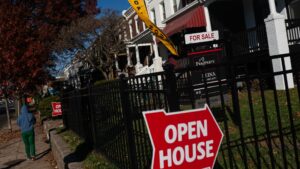Overcoming Homeownership Challenges: Insights from Maryland Governor Wes Moore
In a recent discussion at a BlackRock conference in Washington, D.C., Maryland Governor Wes Moore shared his personal journey that underscores the importance of housing as not just a roof over our heads, but as a cornerstone for security and wealth-building. His experiences offer valuable lessons for anyone navigating the complexities of personal finance. Here’s what we learned from Moore’s story and the broader housing landscape that can guide aspiring homeowners today.
A Journey from Adversity to Opportunity
Governor Moore reflected on his childhood, revealing that his mother initially wanted to send him to military school at a young age to help correct his behavior. However, it wasn’t until he turned 13, after multiple failed attempts to escape the disciplinary environment, that he found his footing. The tuition costs posed a significant barrier, but thanks to his grandparents—who borrowed against their home to fund his education—Moore was able to turn his life around.
This poignant narrative illustrates a key point: housing is not merely a physical space; it serves as a vital asset that can provide leverage during financially challenging times. Moore emphasized that homeownership grants individuals not only shelter but also the potential for security, investment, and generational wealth transfer.
The Current Housing Crisis: A Generation in Limbo
Despite these benefits, many aspiring homeowners today face daunting hurdles. According to Governor Moore, around 30% of young Marylanders are considering leaving the state due to soaring housing costs. Nationally, the data paints a stark picture as well. A report from the Joint Center for Housing Studies at Harvard revealed that the number of cost-burdened renters—those spending over 30% of their income on housing—reached record heights in 2022. For many, the dream of homeownership feels increasingly unattainable.
Recent research from the Urban Institute further underscores this grim reality, showing a significant decline in homeownership among today’s 35- to 44-year-olds. This group, which should be in their peak home-buying years, is experiencing a homeownership rate that has dropped over 10% compared to their predecessors in 1980. Such trends can have long-term ramifications on wealth accumulation and financial stability.
The Wealth-Building Power of Homeownership
Jun Zhu, a fellow at the Urban Institute, pointed out that owning a home is one of the most effective ways to build wealth through home equity. As property values rise, homeowners can leverage that equity to fund other investments, education, or future home purchases. However, the disparity in homeownership rates based on income and education continues to grow, with lower-income households experiencing the most significant declines in ownership rates.
Education is critical to closing this wealth gap. As fewer individuals from lower-income backgrounds attain college degrees, the likelihood of homeownership—and subsequently, wealth accumulation—diminishes.
Bridging the Racial Divide in Homeownership
Compounding these issues is the racial housing divide that persists in America. According to the National Association of Realtors, while the Black homeownership rate increased slightly in recent years, it still sits at a mere 44.7%. This figure is significantly lower than the white homeownership rate of 72.4%, a gap that continues to limit economic opportunities for many African Americans.
More inclusive policies could pave the way for greater access to homeownership, particularly for marginalized communities. Strategies may include educational initiatives, down payment assistance programs, and reforms to address zoning laws that inhibit housing development.
Conclusion: Taking Steps Toward Homeownership
At Extreme Investor Network, we believe that aspiring homeowners can transform their financial futures through informed decision-making and strategic planning. Here are several actionable steps you can take:
- Educate Yourself: Knowledge is power. Familiarize yourself with the home buying process, from pre-approval to closing costs.
- Explore Assistance Programs: Investigate local and national down payment assistance programs to reduce your upfront costs.
- Improve Your Credit Score: A higher credit score can translate into lower interest rates, making homeownership more affordable.
- Consider Alternative Housing Options: Look into condos, townhomes, or even cooperative housing as more accessible paths to homeownership.
- Stay Informed on Legislative Changes: Keep an eye on housing policy developments that may present new opportunities for first-time buyers.
By leveraging the insights shared by leaders like Governor Moore and actively working towards your financial goals, homeownership may be more attainable than you think.
Stay tuned to Extreme Investor Network for more expert advice and resources designed to empower your financial journey. Let’s build a brighter future together!

